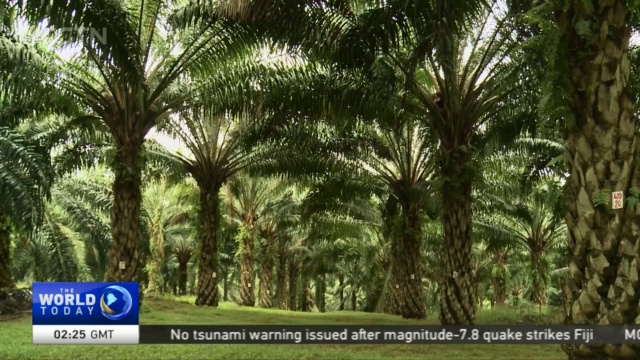
11:29, 07-Sep-2018
China-Malaysia Agriculture Deals: Cooperation targets palm oil, rubber
Updated
10:57, 10-Sep-2018
02:53

Amid all the headlines over high-level political meetings and the fate of a China-backed railway in Malaysia, several moves to increase cooperation went under the radar during Malaysian Prime Minister Mahathir Mohamad's recent visit to China. Memorandums of understanding inked during the visit aim to see the countries combine their research skills in the palm oil and natural rubber industries. And as CGTN's Rian Maelzer reports from Kuala Lumpur, another MoU will be welcome by Chinese lovers of a pungent and prickly fruit.
Partaking in the pungent flesh of a fresh durian is an essential part of the itinerary for any Chinese tourist visiting Malaysia. And until now, they had to come here to do it, with China only permitting importation of frozen Malaysian durian. An MoU signed last month aims to change that by allowing fresh durian imports from Malaysia.
IRENE LEONG YL DURIAN MANOR FARM "This is very exciting news. Knowing that this biggest market in the world will be able to absorb and consume the fruits that we are going to plant and going to harvest, it will give a lot more confidences and excitement to the farmers in Malaysia to actually make their durian plantations on a bigger scale."
There were also MoUs signed involving a commodity upon which Malaysia's economy was built, rubber.
SANKARA NAIR, CHAIRMAN MALAYSIAN RUBBER BOARD "It is with the Hainan State Farms, it's a government corporation. Our MoU grants them technology for rubber roads or rubberised roads, we call them, and in return, the other MoU between them and us is for automation of rubber tapping and they are quite advanced in their research."
Such automation should help increase efficiency and reduce production costs.
RIAN MAELZER KUALA LUMPUR "China is already by far the biggest buyer of Malaysian rubber, and if China were to widely adopt the use of rubber in the construction of roads that could be a huge boost for Malaysia's 10-billion dollar a year industry."
China and Malaysia also signed MoUs on the country's number one commodity, palm oil. The two countries are looking to collaborate on research and development into palm-based biofuel, the health benefits of vitamins and nutrients derived from palm oil, and specialty oils and fats. Palm oil might not excite Chinese consumers or taste buds, the way durian does, but if these agreements boost demand for rubber, palm oil and durian that would be nothing to sniff at. Rian Maelzer, CGTN, Kuala Lumpur.

SITEMAP
Copyright © 2018 CGTN. Beijing ICP prepared NO.16065310-3
Copyright © 2018 CGTN. Beijing ICP prepared NO.16065310-3